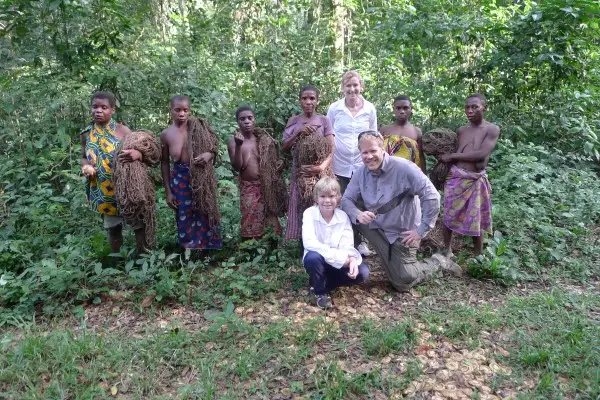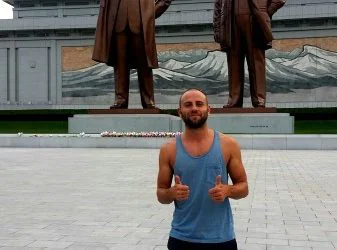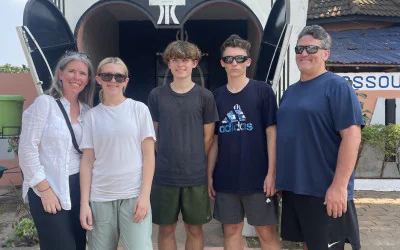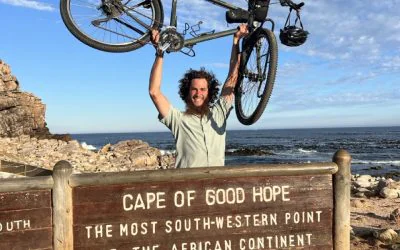Scott Keller is one of those all-rounders who make it all look easy: author, successful consultant, musician, family man and, as of this year, one of the UN Masters. We are very honoured to close 2019 with Scott as our guest.
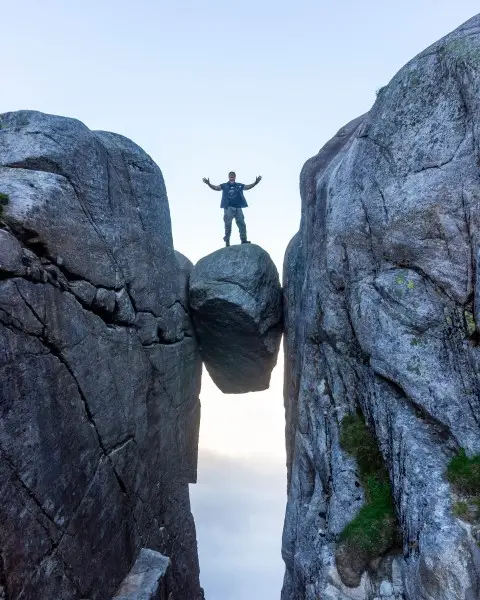
Scott, tell us a little about your background and how your love for travel developed.
My parents would be the first to say it didn’t come from them – we never left the country when I was growing up. I’d say, however, it was precisely that insularity that made things like Tintin’s adventures in faraway lands and Indiana Jones’ swashbuckling through ancient ruins capture my imagination as a child – I loved reading and watching movies set in distant lands.
Even so, all the way into my college years I had no intention of hitting the road. I distinctly remember a first date during my first year at University with a girl who responded to my “What are your dreams in life?” question with, “To travel the world”… to which my narrow-minded and distinctively un-sexy response was, “Really, why would you want to do that, life is great here.” Needless to say, there was no second date!
Fast forward a few years, I decided to complete an MBA at the same time I was finishing my Bachelors in Engineering. This meant an extra year of school, and I was keen that it not be a “rinse and repeat” of the previous four, so decided to sign up for a semester abroad in Santiago, Chile.
One day walking through the city I saw a poster in a travel agency advertising a trip to Machu Picchu to view the solar eclipse (this was 1994 and some of the best views were from Peru). The picture looked like a place Tintin and/or Indiana Jones would adventure to, and while I didn’t have the money to do the tour, I vowed to make my way there independently.
After riding in and on the top of multiple rickety buses filled with locals and livestock, sleeping in hostels barely worth their “dollar a day” price tag, and being chased by thugs through the back alleys in the Peruvian border town of Puno, I finally arrived in Cuzco. There I met an incredibly interesting and diverse set of fellow travelers and together we were then engulfed and enthralled by the magic of Machu Picchu. As incredible as the destination was, however, it was the journey that intoxicated me. I’d never felt quite so alive as during that trip and when I got back to Santiago I felt like I’d lived a lifetime – I was hooked!
Following graduation, I hit the road in Europe (visiting several travelers I’d met in Cuzco while there), a trip during which I met my Australian wife who was also going country to country. We soon moved down under together, and the travel has never really stopped since then!

You’re from the US. How has that influenced who you are and your outlook?
There’s a fine line between ignorance/arrogance and pride/confidence and while I’d like to say as an earlier traveler that I was proud and embracing of my US heritage and it gave me confidence to spread my wings – the reality is that I was more ignorant and arrogant than I could have ever realized. In fact, when I first met my now wife on a train platform in the Czech Republic, she quickly wrote me off as “too American” given some of my mannerisms. Because of who she is, she wasn’t afraid to say so – and our first train ride together was a heated discussion on the matter. To my surprise and horror, she won the debate. To her surprise and horror, I won her heart :-).
I do think it’s particularly easy to become unconsciously insular growing up in the USA. It’s big (lots to do in its borders), powerful (not overly dependent on others for security), and a net exporter of popular culture. Paradoxically, its “melting pot” nature also contributes – in spite of its many positives, it also can create a false sense of feeling in touch with other cultures simply due to diverse ancestries. My family was quick to claim its Irish heritage, but in practice that manifested itself only in perpetuating stereotypes (e.g. thinking everyone in Ireland eats corned beef and cabbage for dinner St. Patrick’s Day!).
I’d hope to think that now – forged in the humility and mind-expansion that travel and experience bring – I have a healthier and clearer-eyed pride in (and gratitude for) the positive aspects of being American. And I do think that does give fuel a confidence/optimism to travel off the beaten path that I might not have otherwise.
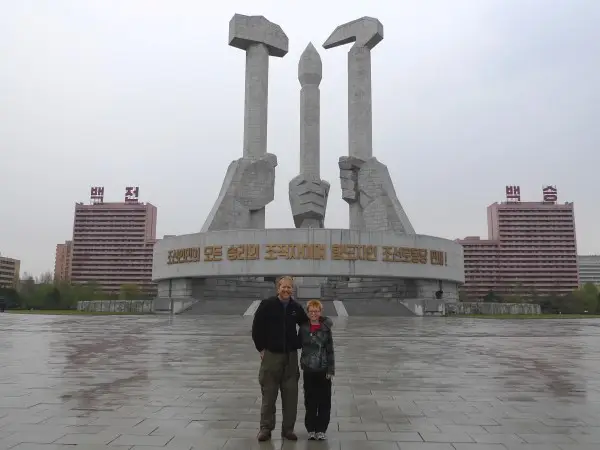
You recently completed visiting every country in the world. What motivated you to do them all? And what have you learned from all this?
Like many travelers that I’ve met, it was on reaching country 100 that I first thought, “Wow, why not do them all?” Until then I didn’t have a goal in terms of quantity – I was simply driven by the rush of being in a new place and experiencing new things.
I feel fortunate in that many people’s family responsibilities naturally tend to stem their travel aspirations. In my case, life has taken some crazy twists such that it’s become the opposite. In 2002 my second child, Jackson, was born. His diagnosis was “profound, diffuse, bilateral brain damage”. Our lives changed dramatically at that point, and everything became focused on how we could help Jackson live as full a life as possible. We moved from Australia to the USA for healthcare reasons (in Australia he was one of a kind, in the USA they’d seen more kids like him). We put everything we had into his therapies which were extremely hands on, 24/7 – and in doing so we worked ourselves to a place where our marriage was on the rocks and my wife and I were on the edge of burn out.
As a circuit breaker we went to Belize for a long weekend. It was the first time we’d travelled together as a couple since Jackson had been born. During that time we realized there was nothing wrong with our relationship – we loved being together, but even our “date nights” had become consumed with talking about logistics or therapies. We agreed to travel together regularly as therapy for us as a couple, and we also agreed that we needed to carve out time for each of us individually to do things to recharge. For me, that involved taking a few trips a year to new countries – losing myself in the moment and recalibrating on what’s important.
As my children got older (Jackson has an older brother and we had a third after him), I endeavored to always take one of my children with me. As such, my oldest has the dubious honor of being the first US minor to have set foot in North Korea as a tourist since the 1950s; my youngest has the distinction of having been to 7 continents by the time he was 7 years old, and Jackson may (unconfirmed) be the first special needs child to have set foot on Antarctica. I’m sure they would have rather gone to Disneyland, but I wouldn’t trade the bonding experiences that the type of off-the-beaten-path travel we’ve done has brought for anything.
In terms of learnings, regarding the travel itself I’d simply steal from Miriam Beard who said, “Travel is more than the seeing of sights; it is a change that goes on, deep and permanent, in the ideas of living.” I’ve also learned a lot from observing my children travelling – they are generally insatiably curious and slow to judge. When we return home, however, many adults in their lives reveal the opposite: few questions are asked, and many preconceptions are asserted. Undoubtedly this dynamic is natural/predictable (people would rather focus on shared experiences and things that are relevant in their lives) but observing such behaviors has definitely prompted me to be more “childlike” in this regard.
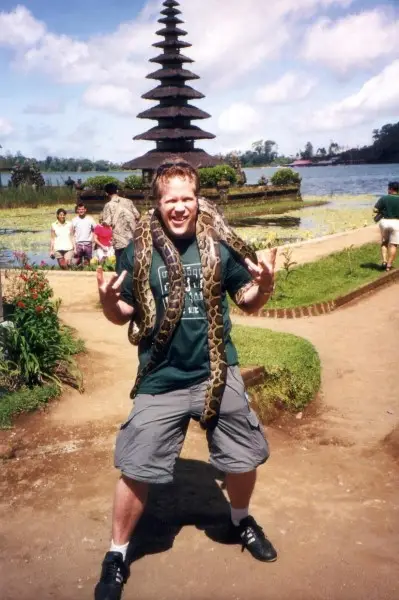
What kind of traveler do you consider yourself?
In the early days I was your typical backpacker – living on a few dollars a day, happy to shower with cock roaches (or not at all!) if it meant my I could fit in another country. I enjoyed travelling alone only in that it allowed me to meet up with other travelers as I went. I also was faithful to the Lonely Planet as my guide; no need to pay for local guides or tours along the way.
Once I started my professional life, anytime I had to travel internationally for work, I’d add on a new country on the way and/or on the way back. This meant business class to and nice hotels at the “hub”, and then economy flights and hostels for the satellite destinations. It also meant time was more constrained than money, and as such getting a local guide was key both to optimize the ground covered and to get a firmer sense of the place. My combination of personal and professional travel means I rack up an inordinate amount of frequent flyer and hotel loyalty points and, as a result, trips with family members typically involve routings that take advantage of such.
Probably the most defining aspect of my travel is that I have a fairly strict definition of what a country is and what counts as a visit to a country. My country list includes any that are formally recognized by the UN and any territories/colonies/constituencies that seem to me like they should can be considered separate due to culture (e.g. monetary system, language, customs), geography (remote), and/or history/proposed status (e.g. was an independent country for most of history/likely to be independent in the future). French Polynesia and France, for example, for me count as two separate countries as it relates to travel. Under that definition there are/were 220 countries on my list.
In terms of a what “counts” as a visit to a country, it involves taking a selfie in front of an iconic/ identifiable site in the country (cannot be in an airport!), having local meal, conversing with a local (a local guide counts), and at minimum spending a half day on the ground seeing and experiencing the place (the target time spent being a day or two on the ground to enable me to get out of main cities to see some of the countryside).
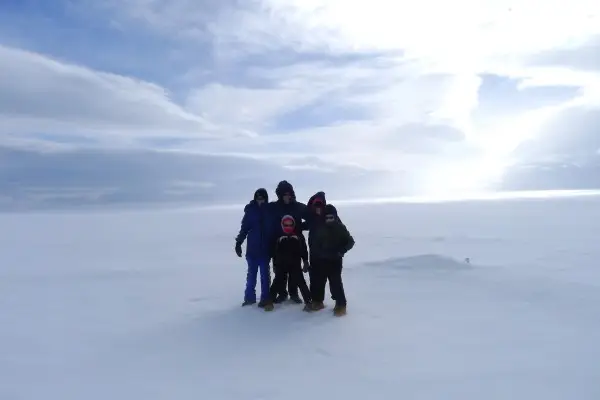
Tell us a few travel stories which have really made a difference to you.
I’ll start with Antarctica. It was the first “off the beaten path” trip we endeavored to do as a family of five. We fought for 10 years to give Jackson the basic functions that define us as humans (walk on two feet, appose forefinger and thumb to write, converge eyes at near point to read, coordinate lips, nose, throat, and breath to speak, etc.), and then to get a degree of behavioral and emotional control over his functional abilities. He wasn’t coordinated enough that he could be on a ship, so we charted a flight from Punta Arenas in Chile and arranged to meet up with an Antarctic explorer to take us around from research station to research station in a Snow Cat (and to stop and see a few penguins along the way!).
I’ll never forget seeing our guide smile at me as I climbed out of the six-seat plane we had flown over the Drake Passage on, and then to see the smile turn to a dropped jaw as the rest of the family progressively emerged from the plane behind me. “You didn’t tell me they were kids!” were his first words (he had the tact not to add “and that one has special needs”, but it was clear that added insult to injury). I hadn’t done so on purpose – in our e-mail correspondence it simply never came up (he asked for how many in our party, so I simply responded with “Five”).
After that rocky start, the trip was absolute magic, and Jackson completely rose to the challenge of getting in and out of the Snow Cat, keeping his gloves, hat, and mask on enough to avoid frostbite, and ably explored penguin colonies and glaciers ably keeping up with his brothers. He even packed and threw a snowball or two! To have everyone together doing something so “us” was pure magic – I get tears of joy in my eyes even thinking about it now!
On a more somber note, the second would be Rwanda, which touched me deeply. I was being guided around a church by a Rwandan who was probably 10 years younger than me at the time (I was in my mid-30s). He described the atrocities that had happened there with vivid detail, and with an emotion that was more gut wrenching than any other experience I’d had in my travels. As we got near the altar, he pointed to a little enclave nearby – kind of like a cupboard but without a door, and he said, “This is where I was hiding.”
It was only then I understood I was getting an eye-witness account, and further realized that everything he was describing happened under the watch of my generation (unlike, say, what happened under Hitler, Pol Pot, Pinochet, etc.). I couldn’t help but hug him, and while I haven’t done anything as dramatic as changing my vocation as a result, there’s no question that moment changed me – it made me a better, more compassionate, and more responsible adult.
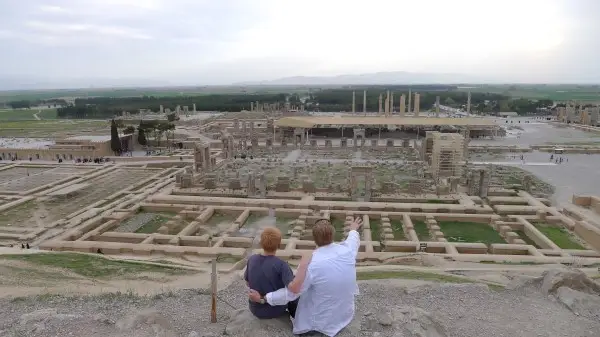
Which country most surprised you and why?
Hmmm, this is a tough one to narrow down as I’d be hard-pressed to name a country that didn’t surprise me in some way. That said, Lebanon would never have been anywhere close to being on my “top 10 countries to visit” list. That is, until I visited. Dramatic landscapes, ancient cities, crusader castles, port towns, sunny beaches, mountain ski resorts, delicious food, olive groves and vineyards, cosmopolitan cities – it’s all there. The X-factor, however, is the people who struck me as 2x as hospitable as most (which is fitting as their word for “hello” literally means “welcome and welcome”). They also by and large appear have found a way to live like every day is their last (a silver lining to the challenges the country has and continues to face).
A few other countries deserve an honorable mention as positive surprises for sure: My experience in Iran was one where it felt like the local population could be my neighbors back at home – generous (my son and I were stranded at the airport in Shiraz at 3am and a family was quick and genuine in their desire to take us in), quick to smile (a walk through a park and you hear a symphony sound of birds chirping and people laughing), and focused on family and friends (people talk together in groups vs. walking purposefully in isolation with their headphones on). Everyone I know who’s been there agrees that the reality on the ground is embarrassingly contrary to how the country is portrayed by the Western media.
When people ask me what my favorite destination has been, however, the answer is easy: Tibet, hands down. Although I’m a beach lover who chooses to live my life drenched in sun and surf in California, to my eyes Tibet has the most unique and spectacular scenery on the planet. Combine that with equally unique people and the calming and connecting spiritual-centeredness of the place and it’s every bit as mystical and magical as it was portrayed in Hergé’s “Tintin in Tibet” back in 1960 (note I was there in 1998, so I don’t know if/how things may have changed since then).
Lastly, from a continental point of view, I was very surprised to find that in spite of Africa by far and away having the lowest per capita GDP of all continents, it seems to me to have the highest number of per capita smiles. In contrast, when I walk down the street in New York City I’m surrounded by tired eyes and long faces. While economic advancement has its virtues, it couldn’t be clearer in comparing the two that money-making is not joy-making.
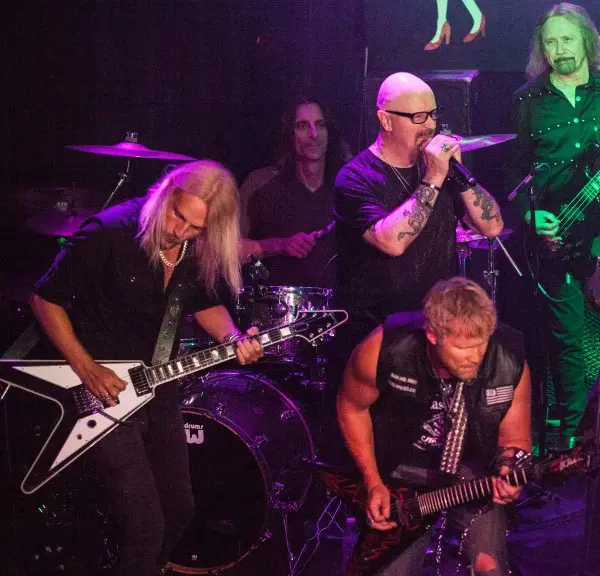
You seem to be an incredible all-rounder. Tell us a little about the non-travel Scott and what he does.
Outside of travel my pursuit are family, heavy metal music, and work. If I’m an “all-rounder” in any manner, it’s because I’ve been able to find intersections among those more often than not.
For example, my oldest son is the drummer in a covers band that I play lead guitar in. We play shows to benefit special needs children and travel far and wide to play (and see) shows wherever we can. We’ve also made the right connections in LA such that together we’ve also had the chance to play with many of our musical heroes from bands such as Judas Priest, Black Sabbath, Megadeth, Queensryche, and so on. My other kids have also picked up instruments (including, miraculously, Jackson), and got into the action such that my family is even part of an upcoming music documentary that will premiere at the Sundance Film Festival next year. That’s a story for another interview, however!
On the work front, I’m a senior partner at large management consultancy where I’ve worked for 25 years now. I co-lead the Firm’s CEO & Board Excellence practice globally and spend most of my time coaching CEOs and senior teams in leading large-scale, multi-year transformational change efforts. I’m probably best known externally for the books that I’ve co-authored, including 2011’s bestseller, Beyond Performance: How Great Organizations Build Ultimate Competitive Advantage (Wiley), and my two most recent, Leading Organizations: Ten Timeless Truths (Bloomsbury, 2017), and Beyond Performance 2.0: A Proven Approach to Leading Large-Scale Change (Wiley, 2019). In terms of intersections, I’d say over 50 percent of those books were written on airplanes en route to or from a new country! I also lead a global affinity group on behalf of the Firm for parents of children with special needs.
On the family front, I do wonder if someday my wife and/or my kids will be doing this same sort of interview as a result of the intersections we’ve found there. My wife has now been to 97 countries (79 of which we travelled to together), my oldest (18) has been to 58, my youngest (13) has been to 42, and even Jackson (16) has racked up 23 despite his challenges!
If you could have one superpower, what would it be?
Easy: teleportation! Between working out of town most weeks for the last 25 years and travelling to every country the world I’ve flown well over 5 million miles (apologies to Mother Earth for my carbon footprint) and have literally spent more than two full years of my life in airports and airplanes. I’d be glad to have that time back, as well as the worry lines on my face erased from due to the many flight delays, occasional extreme turbulence, and a white-knuckle near miss of the runway and grazing of treetops by our Druk Air flight into Paro, Bhutan.
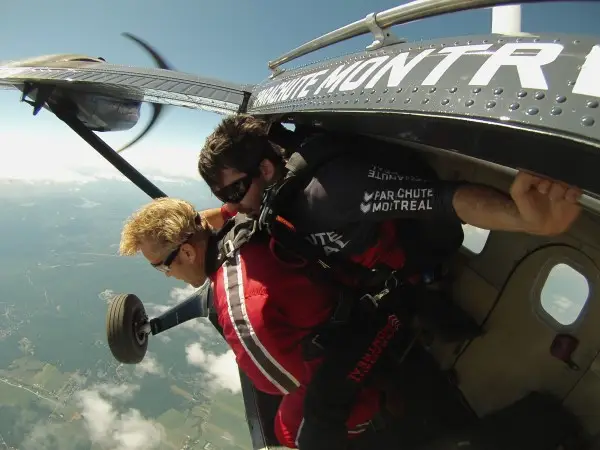
Finally, our signature question – if you could invite any 4 people from any period in human history to dinner, who would you invite and why?
- Philosopher and theologian Søren Kierkegaard. No world view resonates with me as deeply as existentialism (of which he was the first philosopher) with its emphasis on personal choice and commitment, both in the broad context of being human and as a Christian.
- Physicist Stephen Hawking. I’m deeply intrigued by the potential implications of theoretical physics (multiple universes, time travel, how time began, etc.) and his understanding and reconciliation of both relativity and quantum mechanics is unsurpassed and absolutely brilliant.
- Musician Kerry King. As the founder and guitarist of the thrash metal band Slayer, Kerry’s talents have provided much of the soundtrack to my life. He’s also one of a handful of musicians who I admire that I haven’t yet had the chance to meet, thank, and hang out / jam with. He’d also be someone I could actually comprehend and relate to (unlike my previous two choices!).
- Activist and “mother of the civil rights movement” Rosa Parks. She’d no doubt hold court, keeping it real and reminding us that nothing we are talking about is really of any importance in a world full of inequality, injustice, and disadvantage.
